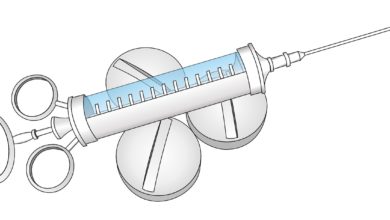Why is Alcohol Unhealthy? Understanding the Risks of Drinking

Alcohol is a popular social lubricant and an accepted part of many cultures around the world. However, it’s important to understand that drinking alcohol, especially in excess, can have serious health consequences. In this article, we’ll explore the reasons why alcohol is unhealthy and the risks associated with consuming too much alcohol.
Alcohol is absorbed into the bloodstream through the walls of the stomach and small intestine. Once alcohol is consumed, it enters the stomach and is broken down by enzymes. The remaining alcohol then moves to the small intestine, where it is absorbed into the bloodstream.
How Does Alcohol Affect the Body?
Alcohol is a psychoactive substance that can affect many different parts of the body. When consumed in moderation, alcohol can produce feelings of relaxation and well-being. However, when consumed in excess, it can lead to a range of negative health effects.
Alcohol’s Effects on the Body;
- Brain and nervous system: Alcohol can interfere with the communication between brain cells, which can cause changes in mood, behavior, and cognition. It can also impair coordination, balance, and judgment.
- Digestive system: Alcohol can irritate the lining of the stomach and intestines, causing inflammation and leading to symptoms like nausea, vomiting, and diarrhea.
- Liver: The liver is responsible for breaking down alcohol in the body. Over time, heavy drinking can cause liver damage, including fatty liver disease, alcoholic hepatitis, and cirrhosis.
- Cardiovascular system: While moderate alcohol consumption may have some cardiovascular benefits, such as raising HDL (good) cholesterol, excessive drinking can lead to high blood pressure, irregular heart rhythms, and an increased risk of heart disease.
- Immune system: Heavy drinking can weaken the immune system, making it more difficult for the body to fight off infections and illnesses.
- Sleep: Alcohol can disrupt the normal sleep cycle, causing insomnia and reducing the quality of sleep.
1- How Drinking Affects Your Brain
Alcohol affects the brain in various ways, and its impact depends on factors such as the amount consumed, age, gender, and genetics. Alcohol is a depressant, which means it slows down the central nervous system, affecting brain activity and communication between neurons.
When you drink, alcohol travels to your brain, where it increases the activity of gamma-aminobutyric acid (GABA) neurotransmitters, which inhibits nerve impulses, causing feelings of relaxation and reduced anxiety. At the same time, alcohol reduces the activity of glutamate neurotransmitters, responsible for brain excitation and cognition, leading to impaired judgment, memory, and coordination.
The impact of alcohol on the brain can be immediate, such as impaired judgment and coordination, slurred speech, and blurred vision, which can affect driving and lead to accidents. Excessive and long-term alcohol consumption can lead to permanent brain damage, including shrinkage of brain cells and reduced white matter, which affects communication between neurons and the ability to process information.
Alcohol and Mental Health
Alcohol consumption can also affect mental health and increase the risk of developing various mental disorders, such as depression, anxiety, and dementia. Although alcohol may provide temporary relief from stress and anxiety, excessive and long-term consumption can lead to the opposite effect, increasing the risk of developing mental health disorders.
Alcohol consumption can also exacerbate existing mental health conditions, leading to worsened symptoms and reduced response to treatment. Alcohol can also affect sleep patterns, leading to disrupted sleep and fatigue, which can affect mental health.
2-The Effects of Alcohol on the Digestive System
Before we can discuss how alcohol affects the digestive system, we must first understand the digestive process. The digestive system is a complex network of organs that work together to break down food and absorb nutrients. The process begins in the mouth, where food is chewed and mixed with saliva, which contains enzymes that begin to break down carbohydrates.
The food then travels down the esophagus and into the stomach, where it is mixed with gastric juices, which contain hydrochloric acid and enzymes that break down proteins. The partially digested food then enters the small intestine, where it is mixed with bile from the liver and pancreatic enzymes that break down fats, carbohydrates, and proteins.
The nutrients from the food are absorbed into the bloodstream through the walls of the small intestine and transported to the liver for processing. The liver filters the blood and removes toxins, including alcohol, from the body.
When alcohol is consumed, it is absorbed into the bloodstream through the stomach and small intestine. The liver then begins to process the alcohol, converting it into acetaldehyde, a toxic substance that can damage cells in the liver and other organs.
When alcohol is consumed, it is absorbed into the bloodstream through the stomach and small intestine. The liver then begins to process the alcohol, converting it into acetaldehyde, a toxic substance that can damage cells in the liver and other organs.
Excessive alcohol consumption can lead to a range of digestive problems, including:
- Inflammation of the stomach lining (gastritis)
- Stomach ulcers
- Acid reflux
- Diarrhea
- Pancreatitis
3- Alcohol and the Liver
The liver is the second-largest organ in the human body and plays a crucial role in maintaining good health. The liver performs various functions, such as producing bile, which helps in the digestion of fats, storing nutrients, and detoxifying harmful substances like drugs and alcohol.
Alcohol and Liver Damage
The liver metabolizes alcohol, but excessive drinking can cause damage to liver cells, leading to liver diseases like fatty liver disease, alcoholic hepatitis, and cirrhosis. Heavy drinking can lead to inflammation and scarring of liver tissue, which can progress to cirrhosis, a condition that can be fatal.
Fatty Liver Disease
Fatty liver disease is a condition that occurs when there is an excessive build-up of fat in the liver. The liver normally has some amount of fat, but in fatty liver disease, the fat content is more than 5-10% of the liver’s weight. The condition is reversible, but if left untreated, it can progress to more severe liver diseases.
Alcoholic Hepatitis
Alcoholic hepatitis is inflammation of the liver that occurs due to excessive alcohol consumption. Symptoms of alcoholic hepatitis include yellowing of the skin and eyes, fever, abdominal pain, and fatigue. In severe cases, alcoholic hepatitis can progress to cirrhosis.
Cirrhosis
Cirrhosis is a severe liver disease that occurs due to chronic liver damage. In cirrhosis, scar tissue replaces healthy liver tissue, which can lead to liver failure. Symptoms of cirrhosis include jaundice, ascites (fluid build-up in the abdomen), fatigue, and confusion. Cirrhosis is irreversible, but early treatment can slow down its progression.
4-Alcohol and the Heart
The cardiovascular system is responsible for circulating blood throughout your body, providing oxygen and nutrients to your tissues and organs. Alcohol consumption can have both short-term and long-term effects on your cardiovascular health.
Short-term effects of alcohol on the heart include an increased heart rate, a rise in blood pressure, and irregular heart rhythms. These effects can occur immediately after consuming alcohol and can last for several hours.
Long-term effects of excessive alcohol consumption can include the development of high blood pressure, heart disease, stroke, and other cardiovascular diseases. The risk of these conditions increases with the amount of alcohol consumed, and long-term excessive consumption can lead to irreversible damage to your cardiovascular system.
Potential Benefits of Moderate Alcohol Consumption
Moderate alcohol consumption, defined as one drink per day for women and up to two drinks per day for men, has been associated with a reduced risk of heart disease. Studies suggest that moderate alcohol consumption may increase levels of high-density lipoprotein (HDL), or “good” cholesterol, which can help protect against heart disease.
Moderate alcohol consumption may also help reduce inflammation in the body, which is a risk factor for heart disease. However, it is essential to note that the potential benefits of alcohol consumption are only seen in moderate amounts, and excessive alcohol consumption can negate any potential benefits.
Risks of Excessive Alcohol Consumption on the Heart
Excessive alcohol consumption can have detrimental effects on your cardiovascular system, including:
- High Blood Pressure: Heavy alcohol consumption can increase blood pressure levels, putting a strain on your heart and increasing the risk of heart disease.
- Heart Disease: Long-term excessive alcohol consumption can lead to the development of heart disease, including damage to the heart muscle, irregular heart rhythms, and an increased risk of heart attack and stroke.
- Cardiomyopathy: Excessive alcohol consumption can lead to the development of cardiomyopathy, a condition where the heart muscle becomes weakened and enlarged, leading to heart failure.
- Arrhythmias: Heavy alcohol consumption can cause irregular heart rhythms, leading to palpitations, dizziness, and fainting.
- Stroke: Heavy alcohol consumption can increase the risk of stroke, a condition where blood flow to the brain is disrupted, leading to brain damage and other long-term complications.
5-Alcohol and the Immune System
The immune system is the body’s defense mechanism against infections, diseases, and other harmful substances. When functioning correctly, the immune system recognizes and fights off harmful invaders, such as bacteria and viruses, to keep the body healthy.
However, excessive alcohol consumption can have a negative impact on the immune system, leading to increased susceptibility to infections and diseases. Alcohol can affect the immune system in several ways, including:
- Damaging the gut microbiome: The gut microbiome is a collection of bacteria, viruses, and other microorganisms that live in the digestive tract. These microorganisms play a crucial role in maintaining the body’s immune system. Excessive alcohol consumption can disrupt the balance of the gut microbiome, leading to increased inflammation and decreased immunity.
- Decreasing white blood cell production: White blood cells are a vital component of the immune system, helping to fight off infections and diseases. However, excessive alcohol consumption can decrease the production of white blood cells, leading to a weakened immune system.
- Impairing the function of immune cells: Excessive alcohol consumption can impair the function of immune cells, including T cells, B cells, and natural killer cells. These cells play a crucial role in fighting off infections and diseases, and their impairment can lead to increased susceptibility to infections.
6- Alcohol effects on sleep
Alcohol can have significant effects on sleep, both in terms of the quality and quantity of sleep that individuals experience. While alcohol may help people fall asleep faster, it can disrupt the normal sleep cycle and lead to poor quality sleep.
One of the primary ways that alcohol affects sleep is by reducing the amount of rapid eye movement (REM) sleep that people experience. REM sleep is a critical stage of the sleep cycle that is associated with many important functions, including memory consolidation, learning, and emotional regulation. When alcohol reduces the amount of REM sleep, individuals may experience cognitive impairment, memory problems, and emotional disturbances.
In addition to reducing REM sleep, alcohol can also cause disruptions in the other stages of the sleep cycle. For example, it can cause individuals to experience more fragmented sleep, which can lead to feelings of tiredness and fatigue even after a full night’s sleep.
Moreover, alcohol can also lead to snoring, sleep apnea, and other breathing problems during sleep, which can further disrupt sleep quality and quantity. These effects can be particularly pronounced for individuals who consume large amounts of alcohol or who drink close to bedtime.
Conclusion
In conclusion, excessive alcohol consumption can have severe consequences on the overall health. It is essential to understand the effects of alcohol on the body and to consume alcohol in moderation. If you or someone you know is struggling with alcohol abuse or addiction, seek professional help immediately.




One Comment